Chương 1: International Economics Is Different potx
Bạn đang xem bản rút gọn của tài liệu. Xem và tải ngay bản đầy đủ của tài liệu tại đây (84.56 KB, 18 trang )
Chapter 1
Introduction
International Economics Is
Different
The objectives of this introduction
1. Showing that international economics addresses
important and interesting current events and
issues.
2. Showing why international economics is different
from domestic economics.
3. Relationship between international trade and
finance
1. International economics addresses important
and interesting current events and issues
1) Why the US pressured the Chinese government
to let RMB appreciate?
2) What are the potential effects of RMB
appreciation on the Chinese domestic
economy?
Chinese imports increase, exports
decrease, some industries are difficult to
survive
3) Sub-prime mortgage crisis : problems of
USD, pressure other countries to devalue,
anti-dumping,etc.
4) The protest against economic globalization
in 1999
in the Seattle ministerial meeting of the
World Trade Organization
one of the largest protests about
issues related to globalization.
a. Claims include:
The US employees lost jobs and their
wages are lowered (senior
management earn 420 times the salary
of the common employees)
Child labor and bad work conditions in
some developing countries (True?):
International competition leads to
weaker regulations about labor standards
and work conditions.
b. Should globalization be stopped?
Poverty is worse in places that have been little
touched by globalization
c.f. countries that are more open to
international trade tend to grow faster.
(e.g. regions like coastal areas in China)
Only 5 % of children work in export industry
c. Solutions to the lower labor standard:
(The effects of globalization)
Long-run: Economic growth and rising income
Higher labor standard is a normal good of income
(True?)
Heavy child labor existed in the US into the
early 20th century. When average per-
capita income reaches $5,000, child labor
nearly disappears.
Short-run solutions:
(Workers also need education and better health to
raise their productivity)
Pay the poor families to send their children to go
to school—Mexico and Brazil
In Pakistan and Bangladesh, children are shifted
from work to school with s stipend
China: Think about the recent campaign in China
about migrant worker’s conditions
5) The euro example:
In early 2002, 12 European countries started to
use a single new currency, the euro
a. Controversial:
Each country no longer has the ability to use its
own national monetary policy
b. Attractive:
Convenient: No need to change money when
crossing a border within the union
Increasing the trade: No exchange risk
c. Challenging
How 25 or more countries can make decisions
about common EU policies as otherwise
independent economic entities
Common money policy
Limitation about fiscal policy: Sovereign debt
crisis in Greece
2. What makes international economics different
from domestic economics?
Nations are sovereign:
No court can enforce its order on them with
a global police force
What about a provincial policy within a country?
1) National government policies matter to other
countries
Why?
a. National governments adopt policies directly
toward international transactions.
e.g. tariff policy
b. Different domestic macroeconomic policies:
Direct impacts: national interests
Indirect impacts: international interests
Example : Bahamas imposed lower tax rate on
capital gains
Many Banks set up branches in Bahamas
because of lower tax rate
→ This tax policy may cause large flow
of international funds.
c. Nations are mostly selfish
Ignoring the interests of other nations
e.g.
In the 1999 protest at Seattle:
How much American protesters speak about
the jobs lost if the US government protect the
US jobs?
2) Second major difference:
Some resources do not move freely between
countries. (labor, land, capital)
Within a country: the factors of production are
mobile in the sense that they could be put to
different productive uses
e.g.: Land could be used for cattle or crop
farming, or construction.
Between countries
land is essentially immobile except in war
Labor usually migrate within the country more
readily than they will emigrate abroad.
(cost, government restriction)
Capital moves more freely, but:
International capital movements can be
disruptive
3. Relationship between international trade and
finance
1) International trade can exist without international
financing arrangement
e.g. direct exchange or barter, cash payments in
gold
2) International finance cannot exist without
international trade
No reason for borrowing , lending or
investing between countries if nothing
could be bought with the loan or
investment
3) Then what’s the role of international finance?
a. Facilitating and expanding international trade
b. A more efficient allocation of international
financial resources
c. Smoothing consumption









